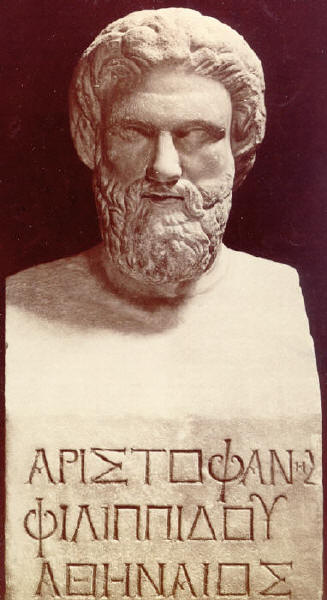The idea of the Classics Club is to read or re-read all those gems of literature that have had an important effect on readers throughout the centuries.
Among the works I chose, I took this opportunity to also visit the ancient Greek plays, having only studied the serious, philosophical prose at school.
I read the The Frogs (Βάτραχοι) by Aristophanes, heralded as one of the major playwriters in Athens, whose works were actually considered teaching material - this play won first place at one of the festivals of Dionysus. I also decided to read it in the original, to feel every nuance of the words used...
Among the works I chose, I took this opportunity to also visit the ancient Greek plays, having only studied the serious, philosophical prose at school.
I read the The Frogs (Βάτραχοι) by Aristophanes, heralded as one of the major playwriters in Athens, whose works were actually considered teaching material - this play won first place at one of the festivals of Dionysus. I also decided to read it in the original, to feel every nuance of the words used...
What a mistake! This is what happens when you only have experienced the serious works of the ancient Greek writers - no one had warned me about the Greek plays, and the foul language they use!!!
Seriously, reading foul language in your mother tongue (I'm not exaggerating, others have since confirmed this) is not at all fun. Being rather on the puritan side (I don't swear at all), I had to stop at frequent intervals, because I was blind with shame (I know, it is ridiculous, and I'm certain the jokes were at the height of entertainment in 405 BC). A mere 70 pages took me over a week to read...
In it, we follow the story of Dionysus himself, who is desperate about the state of Greek tragedians. To remedy this, he decides to travel to Hades (the underworld) and look for Euripides and bring him back to the world of the living and revive the theatre. This is the first point that got me puzzled: the story laments the downfall of the playwriting, yet it uses the same profanity that has degraded many plays - what method is this that steers you away from foul language using foul language?
In any case, the middle part of the play describes this journey, which includes three mix-ups between Dionysus, Xanthias, his slave, and Heracles, Dionysus' half brother's attire. This was also the part I really couldn't figure out: why would we care about these mix-ups? The story is about the degrading of the tragedies written (which will be retributed towards the end of the play with a contest between Euripides and Aeschyllus). The only reasoning I can give is to provide a light entertainment for the audience. This part is weightless, a case of mistaken identities, and a series of fart jokes... Come to think of it, even modern Greek theatre comedies follow this scheme - in that respect, Aristophanes was indeed the teacher of us all!
But even I will admit that there is a message in this seemingly harmless play: the younger generation is destroying Athens, has long ago forgotten their heroes, has no recollection how things were and must urgently make this journey to bring the good old times back (in this case, most probably exiled general Alcibiades) before it is too late. A highly political play, modernised and full of extra tidbits to appeal to the audience at the time. With that in mind, I can almost forgive the other parts of the play...
And the frogs? they appear only once in the whole play with their rythmic "Brekekekéx-koáx-koáx" - something like a nursery rhyme for people of my generation. We would
Also read for the European Reading challenge

Having dropped Greek in my second year of high school, I really can't remember what we used to read back then. It had something to do with oi peloi (the people? Sailors?) but that's about it. I can't imagine reading a crude play that was originally written in ancient Greece or Rome. Unlikely though it seems, I am curious enough to take a peek... but 70 pages of it is a little much I applaud you for finishing it!
ReplyDelete(yes, oi polloi= οι πολλοί= many, the masses). The language itself was not a problem, because modern Greek still has a rapport with the ancient one, but rather the "laughing" material...
DeleteYou have me curious about the foul language... sort of like rubber-necking an auto accident. I know it will be bad, but I just HAVE to take a look anyway! -Sarah
ReplyDeleteUntil then, I only knew those ancient Greek texts that were representative of the philosophical elite... Imagine my surprise when I found what they were really talking about!
DeleteWell congratulations even for reading it, even if it wasn't what you had in mind!
ReplyDeleteSorry, I have lost track of whether you finished the European Reading Challenge or not. There is a Wrap Up page available, so if you do a wrap up post, please add your link on the page.